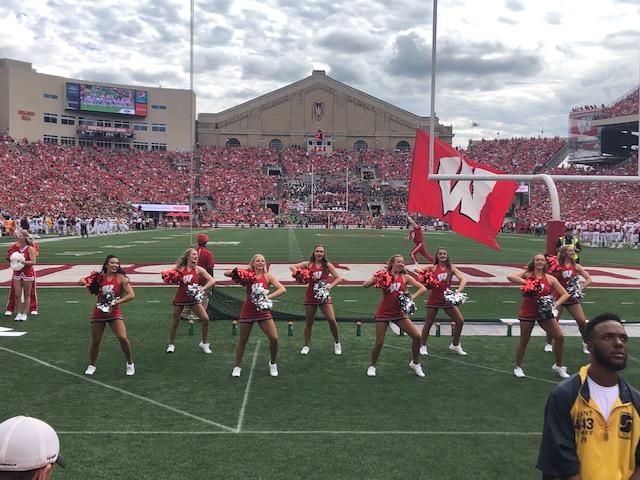Allow me to preface my writing by saying this: I am not an Oscar-the-Grouch-esque individual who sits at the sports bar only to continually complain that NFL players are paid more than brain surgeons. I understand why professional athletes get paid the money they do, and I don’t necessarily object to the phone-number-like sums sitting in the bank accounts of generational talents such as LeBron James or Tom Brady.
By the conclusion of my senior year in high school I had been to a total of two sporting events — the first of which I was required to attend for work reasons, and the second of which was held at my high school. I walked out early on the latter.
But now I find myself enrolled at an institution that lives, breathes and dies by a football. 247Sports currently ranks the University of Wisconsin as having the 20th-best college sports program in the country.
And so in the midst of all this, I’ve become somewhat puzzled. Why are sporting events such a prominent part of our lives and culture, and what makes them so wildly popular?
My perspective on televised sports is an ever-evolving one. Over the past four or five months, I have taken up a casual interest in basketball. No, I don’t watch the games and I still don’t understand why slightly over 20 million people would tune in to watch the NBA finals.
A look at the camaraderie, culture surrounding Wisconsin men’s basketball program
What I find fascinating about the NBA is the players. What it must be like for 19-year-old Zion Williamson to know there have been, for the last couple of months, hoards of Nike representatives, agents, teams and fans drooling over the opportunity to get his signature on a piece of paper. How it must feel for Jeremy Lin, a former star, lauded underdog and massive crowd-pleaser, to endure a slew of injuries and go unsigned during free agency.
These are real people with real struggles and victories, played out on an international stage.
The NBA strikes me not only as an athletic contest but also as a very juicy and detailed reality show — one which stars a cast of supermen, capable of jumping to inhuman heights and dribbling a basketball in ways completely foreign to the average individual. It is quite the spectacle.
But I still don’t quite understand the appeal and subsequent popularity of the actual game. Yes, basketball is a sport marked by fast-paced play, speedy turnovers, physical giants and occasionally rough play, but then again, so is ultimate frisbee, a sport which does not receive a fraction of the attention as basketball.
The NFL, on the other hand, is a far more barbaric contest. In this sense, I understand the NFL’s appeal slightly more than I do the NBA’s. The events which transpire in the average football game cater to the parts of us which are enamored by violence.
Of course, this phenomenon is nothing new. Novels such as Dostoyevsky’s “Crime and Punishment” and films such as Quentin Tarantino’s “Kill Bill” have captivated audiences for years.
Psychologist Sheila Kohler wrote about our fascination with violence and the level of control that comes from violence in entertainment.
“Violence, of course, is all around us in reality, and perhaps we like to talk and read about it to make it understandable to us,” Kohler said.
Watching a 300-pound linebacker sack another equally gargantuan specimen of a man is a blatant display of violence, and it’s served to audiences from about 50 different camera angles. What better way to understand the nature of violence than to view from every angle, in 4k, half a second after it happens?
Of course, there must be other reasons, besides violent play, for the success of sports giants like ESPN, a channel which also airs extensive coverage of non-contact sports such as golf and even curling.
Psychologists such as University of Massachusetts-Amherst professor Susan Krauss Whitbourne have theorized that sports are as popular as they are, in part, due to a phenomenon referred to as “basking in reflected glory.”
“Research shows that on the day after a team’s win, people feel better about themselves. They say ‘we’ won, and by ‘we,’ they don’t mean themselves, personally,” Whitbourne said.
Individuals find a sense of deep fulfillment in the success of “their” sports team. It is a sense of pride which can be acquired by doing little more than tuning in on a Sunday night.
As I write these words, I am sitting in my dorm, which at the moment is utterly silent. Everyone else is at the football game. That’s roughly 50 people just in my hallway who’ve all gone to see the aforementioned displays of violence and feel some sense of reflected glory. The whole floor has simply strolled out to root for a group of men to whom they likely have no personal connection, and have never even met before.
What a strange piece of the human experience.
John Grindal ([email protected]) is a freshman studying computer science and neurobiology.





















